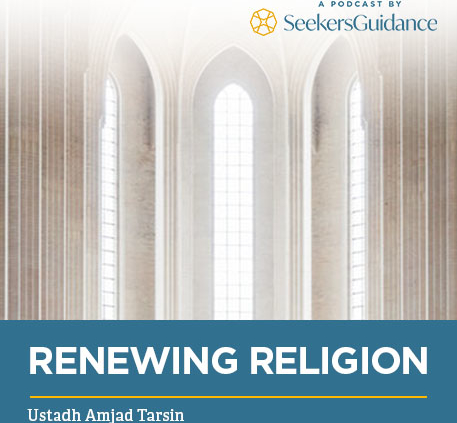07 – Hajj
: Play in a new window | Download to your device (15.0MB)
In this lesson, Ustadh Amjad Tarsin, reviews the chapter on Hajj from Imam Al-Ghazali’s Ihya Ulum al-Din. Imam Al-Ghazali begins by outlining a general rule: that one cannot draw nearer to Allah except through letting go of their worldly attachments.
Ustadh Amjad explains that Hajj, unlike any other forms of worship, cannot be rationalized as to the meaning behind each of its actions. The only lesson that one can derive from Hajj is that you are a servant to Allah and you need to fulfill His commands.
Imam Al-Ghazali outlines in this chapter the etiquettes that one must have during Hajj:
[1] Yearning for the two Holy mosques: this yearning stems from an understanding that this is the House of God, placed for you to fulfill your servitude. The reward for which is gazing upon Allah in the Hereafter.
[2] Buying the two garments of Ihram: then the person should remember that they will be buried in this clothing and even though you have put on these garments you might not actually make it to the Hajj but you will meet Allah in them.
[3] Talbiyyah: At your service Oh Allah, I am at your service, at your service You have no partner, I am at your service. All praise and all blessings belong to You and everything in existence belongs to You, You have no partner. This is the worldly response to what Allah has asked you to do in the spiritual realm, it is a response to the call that Allah tasked Prophet Ibrahim with making for Hajj.
[4] You should be fearful when you enter that you are not worthy but your hope should be greater than your fear. The fear should bring upon you humility and the hope reminds you of the generosity of Allah and His generosity is given to everyone.
[5] At ‘Arafah: when you see many people of various races, backgrounds and groups; that should remind you of the Day of Judgement, each comes with their Prophet. At the end of the day of A’rafah, Allah forgives all the people there and it is a sin to think that Allah has forgiven you.
In conclusion, Ustadh Amjad reminds us to always think of Allah’s mercy as greater than our sin and that Allah is the most forgiving.
In this brief overview of Imam Ghazali’s opus magnum, Ihya Ulum al-Din (Renewing the Religious Sciences), this series will serve as blueprint for how the believer can bring to life their religion. It will aim to help the believer to not just practice the form of the religion properly, but to also practice it with excellence.
Join our Ramadan 2017 program: #RamadanRenewal, in-person at SeekersHub Toronto or online through the SeekersHub Global platform. For more details, visit: http://seekershub.org/ramadan.
Checkout all of the SeekersHub podcasts by visiting http://seekershub.org/podcasts/
